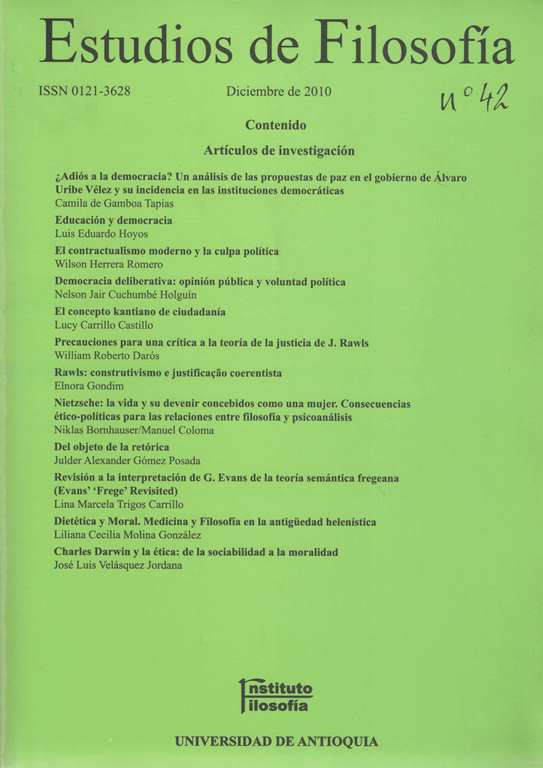On the object of rhetoric
DOI:
https://doi.org/10.17533/udea.ef.11588Keywords:
rhetoric, hermeneutics, philosophy of language, objectAbstract
In regard to the discourse that studies Rhetoric the following matters are considered: Which Ontology is presupposed by a search for the Objective Conditions of Possibility of Rhetorical Discourse? And, are there conditions of this sort? Are there in things themselves of which Rethorical Discourse treats an explanation for the partial character of it? For the first question, the article refers to the Ontology of Institutional Facts developed by J. Searle. To sustain that the answer to the second question is a positive one we take our bearing in the studies on Rhetoric by Ch. Perelman.
Downloads
References
Aristóteles. (1990). Retórica. Madrid: Gredos.
Aristóteles. (1994). Tratados de lógica I. Madrid: Gredos.
Gómez, A. (2004). La importancia de las nociones confusas. Cali, Colombia: Instituto de Educación y Pedagogía Universidad del Valle.
Grassi, E. (2003). El poder de la fantasía. Barcelona: Anthropos.
Lausberg, H. (1975). Elementos de retórica literaria. Madrid: Gredos.
Mason, A. (1993). Explaining Political Disagreement. Cambridge: Cambridge University Press. DOI: https://doi.org/10.1017/CBO9780511598432
Perelman, C. (1964). De la justicia. México: Centro de Estudios Filosóficos Universidad Autónoma de México.
Perelman, C. (1998). El imperio retórico. Santa Fé de Bogotá: Grupo Editorial Norma.
Perelman, C. (1979). The New Rhetoric and the Humanities. London: D. Reidel Publishing. DOI: https://doi.org/10.1007/978-94-009-9482-9
Perelman, C. & Olbrechts-Tyteca, L. (2000). Tratado de la argumentación. Madrid: Gredos.
Searle, J. (1997). La construcción de la realidad social. Barcelona: Paidós.
Downloads
Published
How to Cite
Issue
Section
Categories
License
Copyright (c) 2010 Julder Alexander Gómez Posada

This work is licensed under a Creative Commons Attribution-NonCommercial-ShareAlike 4.0 International License.
Authors who publish with this journal agree to the following terms:
1. The Author retains copyright in the Work, where the term "Work" shall include all digital objects that may result in subsequent electronic publication or distribution.
2. Upon acceptance of the Work, the author shall grant to the Publisher the right of first publication of the Work.
3. The Author shall grant to the Publisher a nonexclusive perpetual right and license to publish, archive, and make accessible the Work in whole or in part in all forms of media now or hereafter known under a Creative Commons Attribution-NoCommercia-ShareAlike (CC BY-NC-SA 4.0), or its equivalent, which, for the avoidance of doubt, allows others to copy, distribute, and transmit the Work under the following conditions: (a) Attribution: Other users must attribute the Work in the manner specified by the author as indicated on the journal Web site;(b) Noncommercial: Other users (including Publisher) may not use this Work for commercial purposes;
4. The Author is able to enter into separate, additional contractual arrangements for the nonexclusive distribution of the journal's published version of the Work (e.g., post it to an institutional repository or publish it in a book), as long as there is provided in the document an acknowledgement of its initial publication in this journal;
5. Authors are permitted, and Estudios de Filosofía promotes, to post online the preprint manuscript of the Work in institutional repositories or on their Websites prior to and during the submission process, as it can lead to productive exchanges, as well as earlier and greater citation of published work (see The Effect of Open Access). Any such posting made before acceptance and publication of the Work is expected be updated upon publication to include a reference to the Estudios de Filosofía's assigned URL to the Article and its final published version in Estudios de Filosofía.















